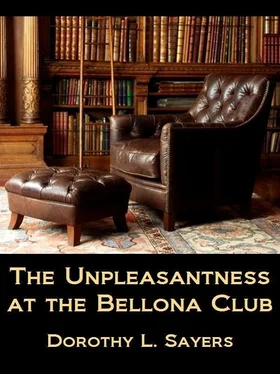“Of course not. jolly good of you to penetrate to this ghastly hole. Come in. Everything’s in a beastly muddle as usual, but when you’re poor you have to live like pigs. Sheila, here’s Lord Peter Wimsey — you have met, haven’t you?”
“Yes, of course. How nice of you to come round. Have you had dinner?”
“Yes, thanks.”
“Coffee?”
“No, thanks, really — I’ve only just had some.”
“Well,” said George, “there’s only whisky to offer you.”
“Later on, perhaps, thanks, old man. Not just now. I’ve had a brandy. Never mix grape and grain.”
“Wise man,” said George, his brow clearing, since as a matter of fact, there was no whisky nearer than the public-house, and acceptance would have meant six-and-six, at least, besides the exertion of fetching it.
Sheila Fentiman drew an armchair forward, and herself sat down on a low pouffe. She was a woman of thirty-five or so, and would have been very good-looking but for an appearance of worry and ill-health that made her look older than her age.
“It’s a miserable fire,” said George, gloomily, “is this all the coal there is?”
“I’m sorry,” said Sheila, “she didn’t fill it up properly this morning.”
“Well, why can’t you see that she does? It’s always happening. If the scuttle isn’t absolutely empty she seems to think she needn’t bother about filling it up.”
“I’ll get some.”
“No, it’s all right. I’ll go. But you ought to tell her about it.”
“I will — I’m always telling her.”
“The woman’s no more sense than a hen. No — don’t you go, Sheila — I won’t have you carrying coal.”
“Nonsense,” said his wife, rather acidly. “What a hypocrite you are, George. It’s only because there’s somebody here that you’re so chivalrous all at once.”
“Here, let me,” said Wimsey, desperately, “I like fetching coal. Always loved coal as a kid. Anything grubby or noisy. Where is it? Lead me to it!”
Mrs. Fentiman released the scuttle, for which George and Wimsey politely struggled. In the end they all went out together to the inconvenient bin in the back yard, Wimsey quarrying the coal, George receiving it in the scuttle and the lady lighting them with a long candle, insecurely fixed in an enamel candlestick several sizes too large.
“And tell Mrs. Crickett,” said George, irritably sticking to his grievance, “that she must fill that scuttle up properly everyday.”
“I’ll try. But she hates being spoken to. I’m always afraid she’ll give warning.”
“Well, there are other charwomen, I suppose?”
“Mrs. Crickett is very honest.”
“I know; but that’s not everything. You could easily find one if you took the trouble.”
“Well, I’ll see about it. But why don’t you speak to Mrs. Crickett? I’m generally out before she gets here.”
“Oh, yes, I know. You needn’t keep on rubbing it in about your having to go out to work. You don’t suppose I enjoy it, do you? Wimsey can tell you how I feel about it.”
“Don’t be so silly, George. Why is it, Lord Peter, that men are so cowardly about speaking to servants?”
“It’s the woman’s job to speak to servants,” said George, “no business of mine.”
“All right — I’ll speak, and you’ll have to put up with the consequences.”
“There won’t be any consequences, my dear, if you do it tactfully. I can’t think why you want to make all this fuss.”
“Right-oh, I’ll be as tactful as I can. You don’t suffer from charladies, I suppose, Lord Peter?”
“Good lord, no!” interrupted George. “Wimsey lives decently. They don’t know the dignified joys of hard-upness in Piccadilly.”
“I’m rather lucky,” said Wimsey, with that apologetic air which seems forced on anybody accused of too much wealth. “I have an extraordinarily faithful and intelligent man who looks after me like a mother.”
“Daresay he knows when he’s well off,” said George, disagreeably.
“I dunno. I believe Bunter would stick to me whatever happened. He was my N.C.O. during part of the War, and we went through some roughish bits together, and after the whole thing was over I hunted him up and took him on. He was in service before that, of course, but his former master was killed and the family broken up, so he was quite pleased to come along. I don’t know what I would do without Bunter now.”
“Is that the man who takes the photographs for you when you are on a crime-hunt?” suggested Sheila, hurriedly seizing on this, as she hoped, non-irritant topic.
“Yes. He’s a great hand with a camera. Only drawback is that he’s occasionally immured in the dark-room and I’m left to forage for myself. I’ve got a telephone extension through to him. ‘Bunter?’—‘Yes, my lord!’—‘Where are my dress studs?’—‘In the middle section of the third small right-hand drawer of the dressing-cabinet, my lord.’—‘Bunter!’—‘Yes, my lord!’—‘Where have I put my cigarette case?’—‘I fancy I observed it last on the piano, my lord.’—‘Bunter!’—‘Yes, my lord!’—‘I’ve got into a muddle with my white tie.’—‘Indeed, my lord?’—‘Well, can’t you do anything about it?’—‘Excuse me, my lord, I am engaged in the development of a plate.’—‘To hell with the plate!’—‘Very good, my lord.’—‘Bunter — stop — don’t be precipitate — finish the plate and then come and tie my tie.’—‘Certainly, my lord.’ And then I have to sit about miserably till the infernal plate is fixed, or whatever it is. Perfect slave in my own house — that’s what I am.”
Sheila laughed.
“You look a very happy and well-treated slave. Are you investigating anything just now?”
“Yes. In fact — there you are again — Bunter has retired into photographic life for the evening. I haven’t a roof to cover me. I have been wandering round like the what d’you call it bird, which has no feet—”
“I’m sorry you were driven to such desperation as to seek asylum in our poverty-stricken hovel,” said George, with a sour laugh.
Wimsey began to wish he had not come. Mrs. Fentiman looked vexed. “You needn’t answer that,” she said, with an effort to be light, “there is no answer.”
“I’ll send it to Aunt Judith of Rosie’s Weekly Bits, ” said Wimsey. “A makes a remark to which there is no answer. What is B to do?”
“Sorry,” said George, “my conversation doesn’t seem to be up to standard. I’m forgetting all my civilised habits. You’d better go on and pay no attention to me.”
“What’s the mystery on hand now?” asked Sheila, taking her husband at his word.
“Well, actually it’s about this funny business of the old General’s will,” said Wimsey. “Murbles suggested I should have a look into the question of the survivorship.”
“Oh, do you think you can really get it settled?”
“I hope so very much. But it’s a very fine-drawn business — may resolve itself into a matter of seconds. By the way, Fentiman, were you in the Bellona smoking-room at all during the morning of Armistice Day?”
“So that’s what you’ve come about. Why didn’t you say so? No, I wasn’t. And what’s more, I don’t know anything at all about it. And why that infuriating old hag of a Dormer woman couldn’t make a decent, sensible will while she was about it, I don’t know. Where was the sense of leaving all those wads of money to the old man, when she knew perfectly well he was liable to peg out at any moment. And then, if he did die, handing the whole lot over to the Dorland girl, who hasn’t an atom of claim on it? She might have had the decency to think about Robert and us a bit.”
Читать дальше












